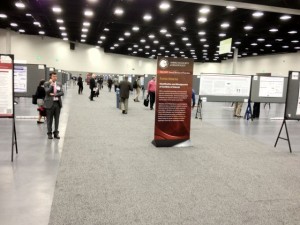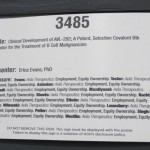Which posters were hot at ASH 2011?
In my final post about the 2011 American Society of Hematology (ASH) annual meeting, I want to highlight a few of the 4000+ posters that appeared to attract a lot of interest.
 The three ASH poster sessions in the equivalent of an aircraft hangar, had a lot of interesting science and clinical data.
The three ASH poster sessions in the equivalent of an aircraft hangar, had a lot of interesting science and clinical data.
All the posters had merit in order to be selected for publication, so my selection is entirely subjective:
Bruton’s Tyrosine Kinase (BTK)
Two posters on products targeting BTK attracted a lot of traffic:
#3485 Clinical Development of AVL-292; A Potent, Selective Covalent Btk Inhibitor for the treatment of B Cell malignancies
#3688 Activity of Bruton’s Tyrosine Kinase (Btk) inhibitor PCI-32765 in Mantle Cell Lymphoma (MCL) identifies Btk as a Novel Therapeutic Target
 Sally Church on Pharma Strategy Blog has written an in-depth piece on Bruton’s Tyrosine Kinase Inhibitors in B-Cell Lymphomas and talks about the above two abstracts.
Sally Church on Pharma Strategy Blog has written an in-depth piece on Bruton’s Tyrosine Kinase Inhibitors in B-Cell Lymphomas and talks about the above two abstracts.
She also discusses the oral presentation at ASH by Dr Susan O’Brien on the phase I/II data for PCI-32765 in CLL.
Dr Anas Younes from MD Anderson Cancer Center also picked BTK as a hot lymphoma topic on his blog about the ASH meeting. On Facebook he notes,
“There is a lot of buzz about the promising clinical results with the oral small molecule inhibitor PCI-32765, which inhibits an enzyme called Bruton kinase (BTK).”
PI3-Kinase Pathway
PI3-Kinase was another topic I noticed there was interest in, and several posters were presented at the meeting. In particular, those on CAL-101 attracted a lot of attention, I have highlighted a couple below:
#1787 A phase I study of the Selective Phosphatidylinositol 3-Kinase-Delta (PI3K∂) Inhibitor, CAL-101 (GS-1110), in Combination with Rituximab and/or Bendamustine in Patients with Relapsed or Refractory Chronic Lymphocytic Leukemia (CLL)
#2699 A Phase 1 Study of the Selective Phosphatidylinositol 3-Kinase-Delta (PI3Kδ) Inhibitor, Cal‑101 (GS-1101), in Combination with Rituximab and/or Bendamustine in Patients with Previously Treated, Indolent Non-Hodgkin Lymphoma (iNHL)
CAL-101 is an inhibitor of the PI3K delta isoform, which is thought to play a key role in lymphomas.
I overheard several people comment that the PI3K space was now becoming very crowded.
With multiple companies including Gilead, Novartis, Roche/Genentech, Sanofi-Aventis, Pfizer and Intellikine to name a few, interested in this target, it will be interesting to see how this market segment develops.
Update December 21, 2011
Little did I know how hot PI3K inhibitors were when I wrote the above with the announcement in the past 24 hours of two PI3K related deals:
- Takeda/Millennium have acquired Intellikine. This deal shows you can still build a biotech company and make money. Congratulations to Intellikine CEO Troy Wilson.
- Exelixis entered into a licensing deal with Merck for their PI3K-delta inhibitor (XL499) that is still in preclinical development.
Interesting contrasts in the two deals: one a total acquisition of the company, the other a licensing deal, but both highlight the potential strategic importance that companies see in having a PI3-kinase inhibitor in their pipeline.
Sally Church on Pharma Strategy Blog has written more about the Intellikine & Exelixis deals in her lymphoma update from the 2011 American Society of Hematology annual meeting.